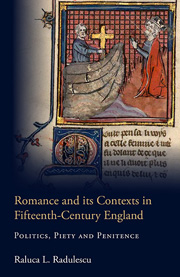Book contents
- Frontmatter
- Dedication
- Contents
- Acknowledgements
- Abbreviations
- Preface
- 1 Fifteenth-Century Contexts for the Reading of Middle English Romances
- 2 Spiritual Journeys through Political Realities: the ‘Pious’ Romances
- 3 Chronicling Britain's Christian Conversion: Henry Lovelich's History of the Holy Grail
- 4 The Politics of Salvation in Thomas Malory's Le Morte Darthur
- Afterword
- Appendix 1 Plot summaries
- Appendix 2 Genealogies
- Bibliography
- Index
Appendix 1 - Plot summaries
Published online by Cambridge University Press: 05 October 2013
- Frontmatter
- Dedication
- Contents
- Acknowledgements
- Abbreviations
- Preface
- 1 Fifteenth-Century Contexts for the Reading of Middle English Romances
- 2 Spiritual Journeys through Political Realities: the ‘Pious’ Romances
- 3 Chronicling Britain's Christian Conversion: Henry Lovelich's History of the Holy Grail
- 4 The Politics of Salvation in Thomas Malory's Le Morte Darthur
- Afterword
- Appendix 1 Plot summaries
- Appendix 2 Genealogies
- Bibliography
- Index
Summary
King Robert of Sicily
Robert, King of Sicily, is known as ‘the flower of chivalry’. His brothers are the Emperor of Germany and the Pope (in some versions, they gain their titles because of his prowess in arms). At midsummer, on the feast of St John (24 June), Robert goes to evensong, but is distracted by thoughts about his high state rather than focusing on his religious duty. On hearing the Magnificat (Deposuit potentes de sedes et exaltauit humiles; He has brought down the powerful from their seats, And he has exalted the humble, Luke 1:52), he asks his clerk to translate it for him. The meaning of the verse angers Robert, who rebels against God, saying the mighty should not fear being brought low and the humble should not come into high position. Then he falls asleep and, in an instant, an angel in his form appears and replaces him, leaving the church with the entire court. Robert wakes up as a beggar and, realising he is alone, asks the sexton to unlock the church door. Neither the sexton nor the castle gate-keeper recognises him. In his fury, Robert gets into a fist fight with the gate-keeper and loses. The angel king assigns Robert the position of court fool; he will have an ape as companion and will eat with the hounds. The angel’s rule is exemplary. After a while the angel decides to visit his brother in Rome, and takes Robert with him. Robert hopes his brothers will recognise him and take revenge on the imposter, but they mock him instead. At his lowest, Robert despairs of his situation and wishes he were dead. He recalls the fate of King Nebuchadnezzar and is moved to accept his own situation. On returning home, the angel orders everyone to leave his chamber, calls Robert in, and asks him once again if he still believes himself a king. Robert’s acceptance of his status of court fool confirms that he has fully repented. The angel restores Robert to his position by disappearing ‘in the twinkling of an eye’, and Robert is once again recognised by his subjects as their king. In some of the versions the Pope preaches a sermon on Robert’s story. In one manuscript version Robert is said to have become a saint.
- Type
- Chapter
- Information
- Romance and its Contexts in Fifteenth-Century EnglandPolitics, Piety and Penitence, pp. 201 - 208Publisher: Boydell & BrewerPrint publication year: 2013

